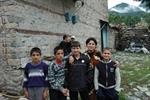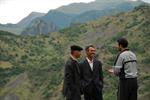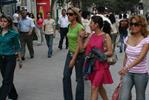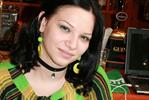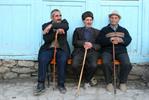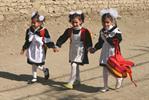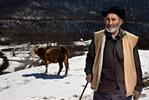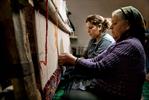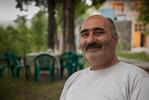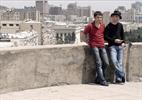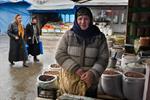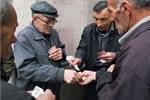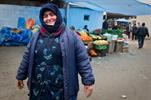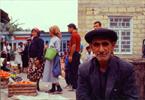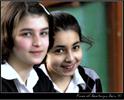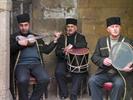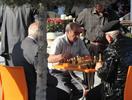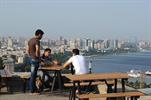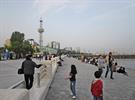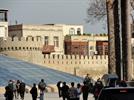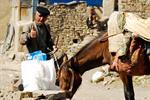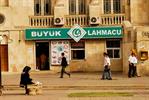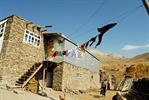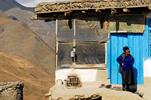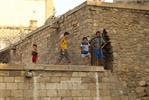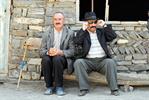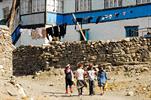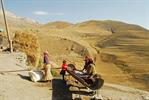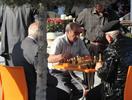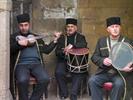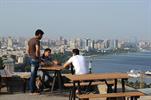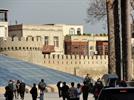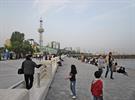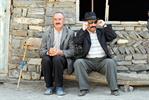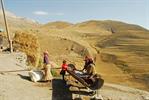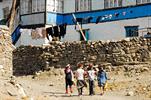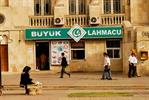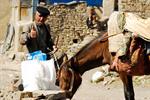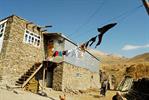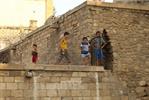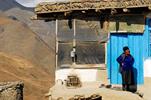Azerbaijan has about 7.8 million people, about the same as the state of Michigan. Only little more than half of them live in cities, in large part because much of the land is suitable for farming. Of those who live in cities, about one-third live in the Baku-Sumgait area. About two-thirds of the city dwellers live along the Caspian Sea coast. The inland towns are small and spread far apart. Ninety percent of the people are native Azerbaijani. Other groups include Russians, Armenians, Turks, Georgians, Ukrainians, Germans, and other nationalities. However, none of these groups have more than 500,000 people living in the entire country. Many of the minority groups have lived in small groups within the cities or countryside of Azerbaijan for several centuries. Although they could be described as native Azerbaijanis, their close-knit culture and choice of religion usually keep them bonded to their original heritage. Many Azerbaijanis also are spread around the world. There are nearly 1 million living in Russia and another 400,000 in the United States. More than 18 million ethnic Azerbaijanis live in the Azerbaijan provinces of northern Iran.
Most of the people speak Azerbaijani, a language that is closely related to Turkish. Russian is still taught in the schools, and most adults speak Russian as one of their primary languages. The Azerbaijani language was originally written in Arabic, but in the 1920s, the Roman alphabet (that used in English and European languages) was introduced. In 1939, the Soviet Union demanded that the country switch to using the Cyrillic alphabet (the one used in Russia). After Azerbaijan gained independence, the government adopted yet another alphabet that was a Turkish version of the Roman script. Nearly all the ethnic Azerbaijanis are Muslim.
The religion, Islam, was introduced to the area during the seventh century and was made the official religion of Azerbaijan in the 16th century. However, during Soviet rule, the practice of religion was condemned. The religious leaders were persecuted and the mosques were closed or destroyed. Since the breakup of the Soviet Union, there has been a revival of the Islamic faith. Mosques have reopened and religious leaders are present again. Saudi Arabia and other Islamic countries have provided financial assistance to promote the Islamic revival in Azerbaijan. However, this does not mean that Azerbaijan is a religious culture. Most of the people do not actively practice their religion. The majority of the people say prayers a few times a day and honor holy days, but they are not opposed to other religious groups. However, the Muslim, Christian, and Jewish groups rarely mix after working hours. Even in the cities, the ethnic groups tend to live in distinct areas. They rarely marry outside their religious groups. Unlike Georgia and Armenia, Azerbaijan has a high rate of population growth. The country increased in population by about 2 percent from 1990 to 2000. This could be a result of Azerbaijan’s relative wealth as compared with Georgia, and Armenia as a result of the country’s abundant oil and gas resources. Nearly half the population work in agriculture, where they can raise their own food and thus afford to have larger families. Most of the Azerbaijanis can read and write as a result of the Soviet Union’s mandatory education system, which has continued after independence, as well. Children must attend at least eight years of school, and most graduate after 10 years. Many go on to attend one of the country’s colleges or technical institutes, including Baku State University, Azerbaijan Technical University, and Azerbaijan State Petroleum Academy.
The National Psyche
The Azeri mindset deftly juggles many apparently contradictory influences: Muslim yet beer-loving, Turkic yet Eurocentric,
overwhelmingly hospitable yet plagued by a strong vein of Soviet-era suspicion. A somewhat intrusive inquisitiveness towards foreigners contrasts with a resigned acceptance of various societal annoyances such as corruption and a devil-may-care driving style.
Azeris have a very strong sense of family and display a total incomprehension at the idea of adults being voluntarily childless. If youТre over 30 and haven't procreated be ready for these standard questions: How many children do you have? None? Why not? What do you live for? What's the problem? Clearly there has to be some physical ailment preventing one from having children. It couldn't possibly be a personal choice. It's even worse if you're a women, because if your 30+ and NOT married, your only viable option is to shrivel up and die. This view is shared by nearly ALL locals you would have contact with (although this is certainly not exclusive to Azerbaijan)
Boys talk about cars and girls and soccer which is OK for a while, but it rarely goes beyond that.
Although frustrating when you're trying to get somewhere quickly, things take time to happen here. It can take ages to get a beer at a cafe. But one can wonder if it's the locals fault for being slow or foreigners fault for always being in a hurry. The area has long been famous for it's hospitality, but many fine that Baku-ites are losing sight of this. But like many places with new found money (and desire for even more) this is bound to happen.
If you're planning a trip to Azerbaijan: Check The latest information of visa regime in Azerbaijan. Please do not hesitate to contact us for consultation.



